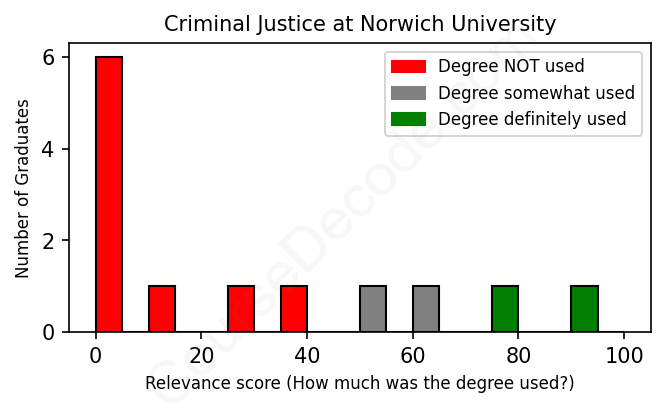
First, some facts. Of the Criminal Justice graduates from Norwich University we've analyzed , here's how many have used (or NOT used) their degree in their career:

These are estimates based on AI analysis of 13 LinkedIn profiles (see below).
The verdict? Horrible! Overall, with an average relevance score of 27%, Criminal Justice graduates from Norwich University have an exceptionally lower likelihood (-40%) of finding work in this field compared to the average graduate across all fields:
And for comparison, here's the chart for all profiles we've looked at across all degrees.
Also, after graduating, only 30% of these graduates have pursued further education other than another Bachelor's degree (such as a Masters degree or other), compared to the average across all profiles of 35%. This suggests a Bachelors degree is enough for most Criminal Justice graduates, and it's normal to look for work straight after graduation.
See the details:
|
Relevance score: 50% We think this person has gone into a career only somewhat relevant to their degree. We think this person has gone into a career only somewhat relevant to their degree.
DEGREE INFOGraduated in 2023 from Norwich University with a Bachelor of Arts - BA in Criminal Justice. No other secondary education since. JOB HISTORY SINCE GRADUATIONCounselor in Training Mentor Camp Micah Jun 2023 - Aug 2023 ABOUTNo information provided. |
The top 10 most common jobs done by the graduates we've analyzed (ranked most common to least) are:
From analyzing various LinkedIn profiles of Norwich University graduates with degrees in Criminal Justice, it becomes clear that there's quite a mix in the types of jobs people have landed after graduation. Many graduates ended up in military roles, including positions like Marine Officer and Operations Manager, which, while valuable, don’t always utilize their Criminal Justice education directly. On the other hand, there are a few who managed to secure roles like Police Officer or Security Officer that really tap into the core principles they studied. This shows that while some graduates are applying their knowledge in law enforcement and public safety, many others have taken paths that stray from traditional Criminal Justice roles.
Overall, the relevance of their jobs to the Criminal Justice field seems pretty hit-or-miss. A significant number have taken on positions in logistics, IT, and management, which don't directly relate to what they studied. For example, you have graduates working as IT Specialists or Managers in various sectors, which shows that they might be utilizing their degree in a broader sense or entering different fields that don’t necessitate Criminal Justice knowledge. So, while it’s great to see some graduates getting into law enforcement, a lot of others seem to be carving out their own paths where Criminal Justice knowledge isn’t as central, which is a reality for many who enter the workforce today.
Here is a visual representation of the most common words in job titles for Criminal Justice graduates (this is across all Criminal Justice graduates we've analyzed, not just those who went to Norwich University):

When looking at the career trajectories of graduates from Norwich University with a degree in Criminal Justice, there’s a mix of outcomes. Many of them started in roles that are directly related to the criminal justice field, especially right out of college. For example, several alumni launched their careers as police officers or in military roles, while others took positions in security and logistical operations, which still tie back to public safety and management skills essential in law enforcement. It's pretty common for these graduates to immediately utilize their education and training in jobs that align with their degree, especially during their first few years after graduation.
However, as you look further down the line, say five to ten years later, the picture starts to diversify quite a bit. Some graduates have held multiple roles within military and law enforcement, maintaining that connection to Criminal Justice. Others, though, have shifted into seemingly unrelated fields like IT, sales, or even grocery management. It seems like some graduates have sought opportunities outside of direct criminal justice roles, which might suggest they either changed their interests or found limitations in their initial career paths. So overall, while there are some really strong ties to the Criminal Justice field for many of these graduates, there’s also a fair number who have ventured into quite different territories, reflecting a wider range of career paths beyond their degree. It’s a mix of success and adaptation, just like you’d see in any big group of grads from one school!
Getting a Bachelor’s degree in Criminal Justice at Norwich University, or really any university, can be a mixed bag—it’s definitely not the easiest degree out there, but it's also not the most difficult. You’ll cover a range of topics like law enforcement, forensic science, and ethics, which can be really interesting but also requires some serious studying. If you enjoy learning about the systems that keep society running and are willing to put in the effort, you should be able to handle it. Just be ready for some coursework and projects; it’s a bit of a step up from high school, but still manageable with good time management and a genuine interest in the subject!
Most commonly, in the LinkedIn profiles we've looked at, it takes people 4 years to finish a Bachelor degree in Criminal Justice.
Looking at the career paths of these Criminal Justice graduates from Norwich University, it seems like some have done pretty well, while others might be still figuring things out. For instance, graduates who landed roles in the military or as police officers generally have good starting salaries that can increase over time, especially with promotions. Those in tech positions, like IT specialists or software engineers, can also earn decent money, given the high demand in that field. On the flip side, some, like the student who worked in retail and as a ski instructor, might not be raking it in as much right away. Overall, it looks like many of them are on a solid track, leaning toward making decent money, while a few could be earning more in the long run!
Here is a visual representation of the most common words seen in the "about" section of LinkedIn profiles who have a Bachelor degree in Criminal Justice (this is across all Criminal Justice graduates we've analyzed, not just those who went to Norwich University). This may or may not be useful:

Here are all colleges offering a Bachelor degree in Criminal Justice (ordered by the average relevance score of their Criminal Justice graduates, best to worst) where we have analyzed at least 10 of their graduates: